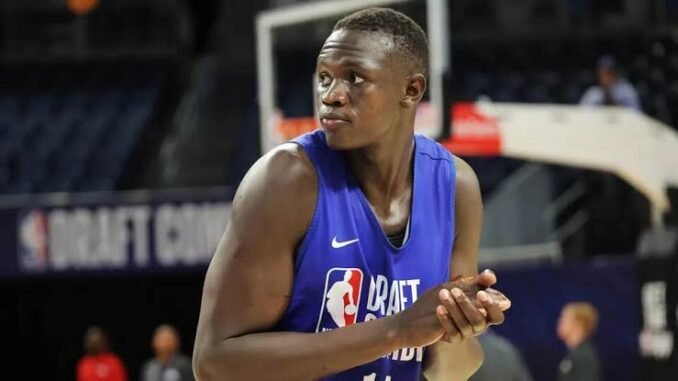
By Andrew Greif and Olympia Sonnier
Edited and restructured for clarity by ChatGPT
When Duke University’s promising freshman center, Khaman Maluach, stepped off the court in April following a standout season, the biggest question surrounding his NBA future had nothing to do with his size, shooting, or defensive instincts. It came down to something far beyond basketball — his passport.
At just 17 years old, the 7-foot-2 South Sudanese native had already built a résumé few his age could match. Born in war-torn South Sudan and raised in Uganda, Maluach had rapidly become one of basketball’s most intriguing young prospects. Last summer, he became the youngest player at the Paris Olympics, representing South Sudan against global powerhouses, including a star-studded U.S. team featuring Kevin Durant and Bam Adebayo.
Then, just weeks before the 2024 NBA Draft, everything changed.
On April 5 — hours before Duke’s Final Four matchup in the NCAA men’s basketball tournament — the U.S. State Department announced that all visas held by South Sudanese passport holders were being revoked. For Maluach, whose meteoric rise had seemed destined to land him in the NBA, the move suddenly cast doubt over his eligibility and future in American basketball.
A Crisis Averted — Behind the Scenes
As questions swirled around Maluach’s draft status, a little-known division of the NBA quietly got to work. The league’s International Basketball Operations team — a 38-person unit with staff in 14 countries — coordinated a response. The team, which has developed deep expertise in immigration law and maintains close ties with governments around the world, began navigating the bureaucratic minefield on Maluach’s behalf.
“People always ask me: ‘What do you do at the NBA? What do international basketball operations do?’” said Troy Justice, the NBA’s Senior Vice President and head of international basketball. “And we say we make dreams come true. We give people an opportunity that wouldn’t have it otherwise.”
That opportunity came full circle on Wednesday night in Brooklyn, when Maluach walked across the Barclays Center stage as the No. 10 overall pick in the 2024 NBA Draft. He’ll begin his professional career with the Phoenix Suns — a dream made possible in large part by the NBA’s extensive international infrastructure and tireless advocacy.
A Global Vision Decades in the Making
The NBA’s international commitment dates back more than 30 years, when the league first began expanding its global footprint. From just 21 international players in 1992, the league had 125 players from a record-tying 43 countries on opening night rosters last fall. That international surge has also reshaped the league’s power structure — with 10 of the last 21 MVP awards going to foreign-born players, including each of the last seven.
As U.S. immigration policies have grown more complex, the NBA has invested in the tools and personnel to help foreign athletes make the transition. It’s not just about visas, Justice said. It’s about understanding the full scope of cultural, legal, and logistical barriers facing international talent.
Travis Murphy, an immigration consultant to the NBA and former diplomat, described it as a “perfect storm.”
“All the domestic leagues — NBA and WNBA included — are expanding their international footprint,” Murphy said. “At the same time, it’s more difficult than ever to travel around the world. And that’s not just for international passports coming into the States — it’s also for U.S. passports abroad.”
From Soccer Fields to NBA Draft Night
Maluach’s journey to the NBA is emblematic of the league’s long-term strategy to cultivate talent from underserved regions. Born in Rumbek, South Sudan, Maluach and his family fled the country for Uganda during his early childhood. He grew up playing soccer — basketball was nearly nonexistent in his community, and the closest court was a 40-minute walk from home.
It wasn’t until 2019, at age 12, that Maluach was spotted by a scout affiliated with the NBA’s African operations. That tip led to a call to Brendan McKillop, Associate Vice President and head of Elite Basketball for the NBA, and soon Maluach was enrolled in the NBA Academy Africa, based in Senegal.
By 14, he was competing in the NBA’s Basketball Africa League and participating in elite development programs like Basketball Without Borders. His rapid development brought him to the United States, where he shined in youth showcases, the G League’s Winter Showcase, and All-Star weekend events — all while the NBA’s international team quietly ensured he could travel, train, and compete without disruption.
When the visa crisis hit in April, that same support network mobilized once again — working behind the scenes to secure his legal status so he could remain in the U.S. and prepare for the draft.
A Dream Realized
Now officially a Phoenix Sun, Maluach’s rise is more than just a story of talent and perseverance. It’s a testament to the infrastructure the NBA has built to globalize the game — and to ensure the dreams of young players like him aren’t derailed by forces outside their control.
“I’m so grateful,” Maluach said. “So many people believed in me and helped me get here. I want to make them proud.”
As the NBA continues to push deeper into new regions and develop talent worldwide, Khaman Maluach may be just the beginning — a 7-foot-2 symbol of how the game, and the dreams it inspires, truly knows no borders.
Leave a Reply